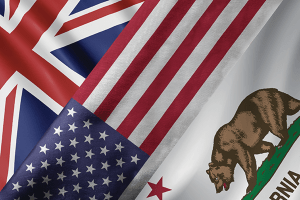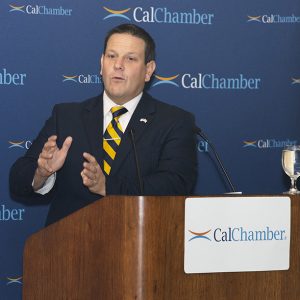 Long ties of trade and friendship between California and the United Kingdom are a solid foundation for continuing relations in this time of flux, a British political scientist and historian told a California Chamber of Commerce audience on September 22.
Long ties of trade and friendship between California and the United Kingdom are a solid foundation for continuing relations in this time of flux, a British political scientist and historian told a California Chamber of Commerce audience on September 22.
Dr. Matt Beech, founding director of the Centre for British Politics and senior fellow at the Institute of European Studies at the University of California, Berkeley, listed things to celebrate and build upon in the relationship between the U.K. and California, as well as the U.K. and the United States.
“The great thing about an open and liberal economy is that trade can bring countries together,” Beech said.
California-U.K. Relations

Highly valued goods are a significant component of U.K.-California trade, Beech said. “What we sell to California, California … sells back to us.”
The high-end products include aeronautical engineering, computer components, chemicals and petrochemicals.
Another factor that bodes well for U.K.-California relations, he said, is that Prime Minister Elizabeth Truss understands the importance of the U.K. trading relationship with the state and is familiar with California, having visited here while she was trade secretary.
Truss was appointed prime minister on September 6, just two days before the death of Queen Elizabeth II ended the beloved monarch’s 70-year reign.
Economics were less of a central concern for Prime Minister Truss’ predecessor, Boris Johnson, Beech commented.
U.S.-U.K. Relations
Prime Minister Truss has taken the role in a challenging time, Beech said, citing the inflation rate in the U.K., the cost-of-living crisis reflected in higher energy costs, Russian aggression in the Ukraine, and the aftermath of the pandemic.
Truss has said that it is unlikely that the U.S. and U.K. will negotiate a trade deal for some years, Beech explained.
Even so, he said, there are solid areas where the U.K. can work together with the U.S. and Biden administration, including human rights, the environment, exchanges and — most important — security.
America is the “central, indispensable partner in NATO” for global security, Beech commented. Also important, he said, is the intelligence sharing between the U.S., U.K., Canada, Australia and New Zealand.
Intelligence work often falls “under the radar,” he observed, but the work the men and women in the intelligence community do to keep society open and free is “absolutely central.”
The most difficult issue for U.K. leaders, Beech said is the Northern Ireland Protocol — the agreement when the U.K. left the European Union not to add customs checks when goods are transported between Northern Ireland (which is part of the U.K. and therefore not part of the EU) and the Republic of Ireland, which remains in the EU and shares a land border with Northern Ireland.
He called the Ireland question a “national headache” for the Conservative Party.
Adding to the concerns of the Conservative Party, which has been in power since 2010, is the rise of the Labour Party. Polls show the Labour Party is ahead and is providing a “very robust opposition” to the Conservative government, Beech commented.
History will decide, he said, whether the resurgent, progressive opposition prevails, as in the late 1990s or “shy Conservatives” come to the fore as in the early 1990s.
Staff Contact: Susanne T. Stirling

